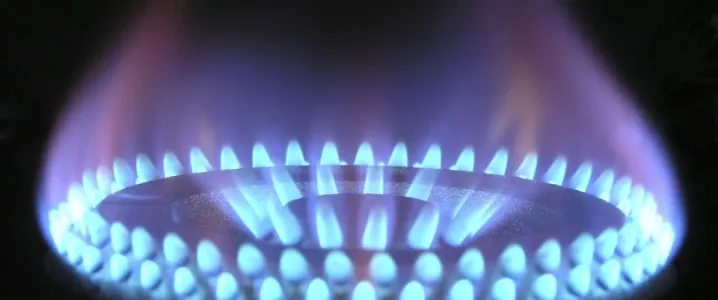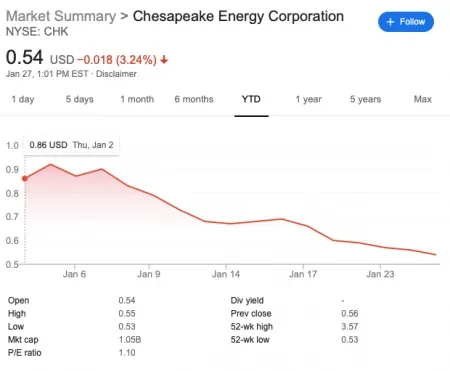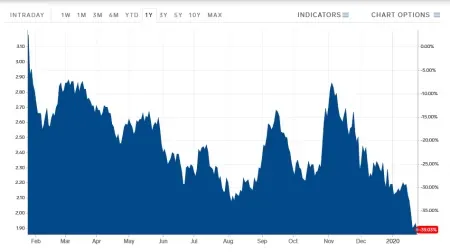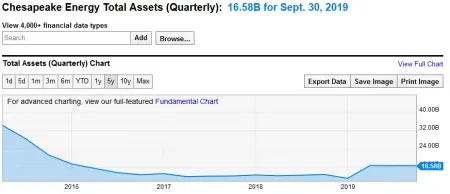
Fracking pioneer and the king of unconventional drilling Chesapeake Energy (NYSE:CHK) is a company in dire straits, which makes it a great bargain right now.
The Oklahoma-based exploration company ushered in America's shale natural gas revolution a decade and a half ago; now, the odds are that it might not even survive the era of cheap gas it helped create.
Chesapeake is the poster child of an industry that at one time had more money to burn than sense.
For years, Chesapeake borrowed heavily to finance an aggressive expansion of its shale projects. But lately, the company has been running on fumes, teetering on the brink of bankruptcy under a mountain of debt that it’s unable to repay thanks to low energy prices remaining stubbornly low.
The company has only managed to get this far through rounds of asset sales (which management is averse to), debt restructuring, and M&A.
Unfortunately, it’s increasingly clear that no amount of financial engineering will save the former energy giant from going under-- save for another large asset sale and subsequent value destruction.
CHK stock is currently flirting with 25-year lows having lost nearly a third of its value in the year-to-date, proving it’s more of a value trap than a good turnaround bet.

Kicking the Can
You can partly blame this mess on Chesapeake’s management which continues to believe its own hype by kicking the can down the road in the hope of a quick recovery in energy prices instead of swallowing the bullet.
About a month ago, shale bulls were optimistic that CHK stock had found a bottom after the company secured a $1.5 billion lifeline in the form of a term loan facility, thus easing near-term liquidity worries following a ‘‘going concern’’ warning by management. CHK stock rallied 64% on the news before shortly giving up all the gains--and then some.
To be fair, Chesapeake’s management has, so far, done a great job at staving off bankruptcy. In its latest restructuring exercise, the company cut a deal with its most high-profile debtholders, restructuring $1 billion in borrowings and exchanging it at 60% on the dollar for new notes. In effect, Chesapeake just stalled a proposed $1 billion in asset sales. The company has also been buying back some bonds at discounted prices and recently announced that it had exchanged over $3 billion in debt.
These moves have bought the company more time to pay off its debt, which the company hopes to do via free cash flows. At the very least, they have lowered the likelihood of a near-term bankruptcy for the company.
However, all that could be little more than rearranging deck chairs on the Titanic unless oil and gas prices rebound in a hurry.
Asset Sale
Chesapeake is now drowning in $9.1 billion of crushing debt, with shareholders equity clocking in at just $4.7 billion. Those figures are likely to keep deteriorating given the company’s high cash burn--last term, the company burned through nearly a quarter of a billion dollars as energy prices remained depressed. Further, the company must pay higher interest rates on the new debt, essentially negating the benefits of the lower principal.
The worst part: Chesapeake is heavily dependent on natural gas, with more than 60% of the company’s revenue coming from natural gas sales last term. Unfortunately, natural gas prices have sunk to multi-year lows, recently dropping below $2/MMBtu--the lowest since March 2016 amid a huge shale oversupply. At these levels, it’s almost certain that natural gas operators like CHK will incur huge losses since liquefying gas and shipping it around the world doesn’t really work at $3/MMBtu and below.
There’s nothing much to cheer on the oil front either, with WTI crude prices currently hovering around $54.20. According to a Bloomberg Energy analyst, Chesapeake needs natural gas prices above $2.75/MMBtu and oil prices above $60 to eke a profit.
Natural Gas Price (USD per MMBtu)
Source: Business Insider
With natural gas and oil prices likely to remain low and Chesapeake burning cash like mad, the million-dollar question is: For how much longer can the company stay solvent?
Right now, it appears that selling more assets is the lesser of two evils for Chesapeake Energy Corp. The last large-scale asset sale by the company dates back to 2014 when it sold a large portion of assets in Utica Shale and Marcellus Formation to Southwestern Energy for net proceeds of $4.975 billion. Three years ago, the company also sold some assets in the Haynesville shale for $465 million.
The good part: Chesapeake Energy still boasts assets to the tune of $16.6B despite years of heavy selling.
Source: Y-Charts
The bad: the recent $11 billion asset writedown by another shale driller, Chevron Corp., does not augur well for Chesapeake, meaning its own assets could be valued at much less than book value.
Verdict: a large asset sale could buy Chesapeake Energy more time as it waits for energy prices to rebound. However, until this actually happens, and energy prices start showing signs of a full recovery, CHK stock will remain only suitable for investors with a long-term outlook who don’t mind its stomach-churning volatility.
By Alex Kimani for Oilprice.com
https://oilprice.com/Energy/Energy-General/As-Gas-Prices-Crash-Will-This-Shale-Giant-Survive.html
13.59 USD has been spent to promote this content using Steemium .
Learn more here!
You got a 6.70% upvote from @minnowvotes courtesy of @steemium!
No , it won't
